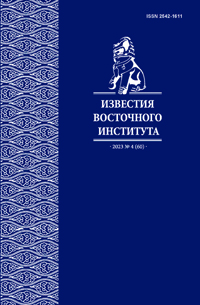The Development of Computational Linguistics and Natural Language Processing Technologies (NLP) in the Republic of Korea and the DPRK: Opportunities for Korean Studies in Russia
DOI:
https://doi.org/10.24866/2542-1611/2023-4/91-99Keywords:
DPRK, Republic of Korea, Natural language processing (NLP), corpus linguistics, Korean language corpusAbstract
The article examines achievements in natural language processing technologies in Republic of Korea and Democratic People's Republic of Korea. An overview of institutes conducting natural language processing research is provided along with an assessment of the work done by ROK and DPRK scientists. The issue of machine translation of DPRK texts based on existing parallel corpora and machine translation tools is discussed. The potential for applying corpus linguistics methodology (the corpus method) to improve the teaching of Korean language in Russian universities is investigated. The paper aims to comprehensively map the current state of natural language processing research and applications in the two Koreas and explore possibilities for cooperation and knowledge transfer that could accelerate progress.




